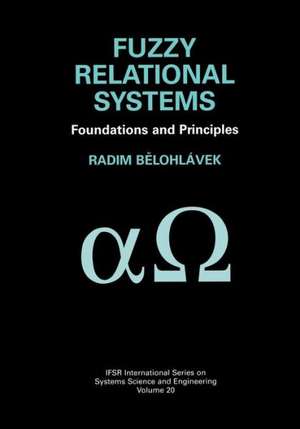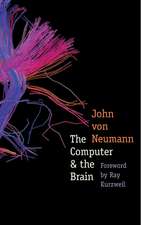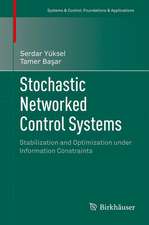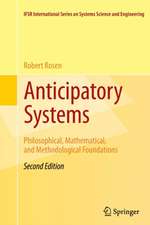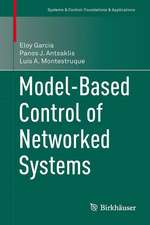Fuzzy Relational Systems: Foundations and Principles: IFSR International Series in Systems Science and Systems Engineering, cartea 20
Autor Radim Belohláveken Limba Engleză Paperback – 16 sep 2012
| Toate formatele și edițiile | Preț | Express |
|---|---|---|
| Paperback (1) | 953.03 lei 6-8 săpt. | |
| Springer Us – 16 sep 2012 | 953.03 lei 6-8 săpt. | |
| Hardback (1) | 960.61 lei 6-8 săpt. | |
| Springer Us – 30 iun 2002 | 960.61 lei 6-8 săpt. |
Din seria IFSR International Series in Systems Science and Systems Engineering
- 18%
 Preț: 955.70 lei
Preț: 955.70 lei - 18%
 Preț: 951.91 lei
Preț: 951.91 lei - 18%
 Preț: 1391.21 lei
Preț: 1391.21 lei - 18%
 Preț: 955.56 lei
Preț: 955.56 lei -
 Preț: 387.58 lei
Preț: 387.58 lei - 20%
 Preț: 994.73 lei
Preț: 994.73 lei - 18%
 Preț: 1132.33 lei
Preț: 1132.33 lei - 15%
 Preț: 637.59 lei
Preț: 637.59 lei - 15%
 Preț: 640.24 lei
Preț: 640.24 lei - 20%
 Preț: 989.79 lei
Preț: 989.79 lei - 18%
 Preț: 947.67 lei
Preț: 947.67 lei - 15%
 Preț: 643.84 lei
Preț: 643.84 lei -
 Preț: 386.61 lei
Preț: 386.61 lei - 18%
 Preț: 1109.92 lei
Preț: 1109.92 lei - 20%
 Preț: 501.43 lei
Preț: 501.43 lei - 18%
 Preț: 1116.26 lei
Preț: 1116.26 lei -
 Preț: 399.29 lei
Preț: 399.29 lei - 20%
 Preț: 644.48 lei
Preț: 644.48 lei -
 Preț: 391.40 lei
Preț: 391.40 lei - 15%
 Preț: 646.62 lei
Preț: 646.62 lei - 19%
 Preț: 447.27 lei
Preț: 447.27 lei -
 Preț: 388.52 lei
Preț: 388.52 lei - 18%
 Preț: 792.03 lei
Preț: 792.03 lei - 15%
 Preț: 648.42 lei
Preț: 648.42 lei - 18%
 Preț: 786.36 lei
Preț: 786.36 lei -
 Preț: 520.08 lei
Preț: 520.08 lei - 15%
 Preț: 643.00 lei
Preț: 643.00 lei
Preț: 953.03 lei
Preț vechi: 1162.23 lei
-18% Nou
Puncte Express: 1430
Preț estimativ în valută:
182.39€ • 189.71$ • 150.57£
182.39€ • 189.71$ • 150.57£
Carte tipărită la comandă
Livrare economică 14-28 aprilie
Preluare comenzi: 021 569.72.76
Specificații
ISBN-13: 9781461351689
ISBN-10: 1461351685
Pagini: 384
Ilustrații: XII, 369 p.
Dimensiuni: 178 x 254 x 20 mm
Greutate: 0.66 kg
Ediția:Softcover reprint of the original 1st ed. 2002
Editura: Springer Us
Colecția Springer
Seria IFSR International Series in Systems Science and Systems Engineering
Locul publicării:New York, NY, United States
ISBN-10: 1461351685
Pagini: 384
Ilustrații: XII, 369 p.
Dimensiuni: 178 x 254 x 20 mm
Greutate: 0.66 kg
Ediția:Softcover reprint of the original 1st ed. 2002
Editura: Springer Us
Colecția Springer
Seria IFSR International Series in Systems Science and Systems Engineering
Locul publicării:New York, NY, United States
Public țintă
ResearchCuprins
1. Preliminaries.- 1.1 Sets, relations, mappings.- 1.2 Ordered sets, lattices.- 1.3 Tolerances, equivalences.- 1.4 Algebras.- 2. Fuzzy Approach, Graded Truth, and Structures of Truth Values.- 2.1 Fuzzy approach: from resolving paradoxes to engineering applications.- 2.2 Graded truth and structures of truth values.- 2.3 Residuated lattices.- 2.4 Residuated lattices and t-norms.- 2.5 Bibliographical remarks.- 3. Fuzzy Structures.- 3.1 Fuzzy sets and fuzzy relations.- 3.2 Fuzzy logic: syntax and semantics.- 3.3 Similarity issues.- 3.4 Morphisms, products, substructures.- 3.5 Representation by crisp structures: cutlike semantics.- 3.6 Algebras with fuzzy equalities.- 3.7 Many-sorted case.- 3.8 Bibliographical remarks.- 4. Binary Fuzzy Relations.- 4.1 Operations and properties of binary fuzzy relations.- 4.2 Similarity: fuzzy equivalences.- 4.3 Hierarchy: fuzzy order.- 4.4 Bibliographical remarks.- 5. Object-Attribute Fuzzy Relations and Fuzzy Concept Lattices.- 5.1 Conceptual granulation: fuzzy context, fuzzy concepts, and fuzzy concept lattice.- 5.2 Similarity and logical precision.- 5.3 Fuzzy Galois connections.- 5.4 Main theorem of fuzzy concept lattices.- 5.5 Bibliographical remarks.- 6. Composition and Decomposition of Fuzzy Relations.- 6.1 Composition of fuzzy relations.- 6.2 Decomposition: fuzzy relational equations.- 6.3 Bibliographical remarks.- 7. Miscellanea.- 7.1 Fuzzy closure operators and similarity spaces.- 7.2 Applications of selected results to some problems and models.- 7.3 Fuzzy logic with truth degrees in residuated lattices.- 7.4 Bibliographical remarks.- References.
Caracteristici
Presents a general theory of fuzzy relative systems with respect to models and methods Written in a mathematical style Explains the algebraic character of fuzzy relational systems using complete residual lattices Surveys several aspects of fuzzy relational modeling, structure and results Focuses on phenomena hidden in classical model theory, as well as, classical results in their generalized form Presents the subject in a logical, self-contained fashion Discusses several other important subjects on the topic of fuzzy relations and logic
